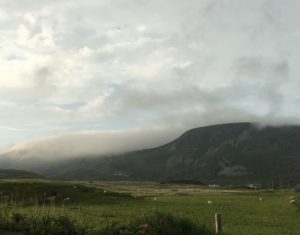Last night in the pub, we sang The Parting Glass. Time is officially up. There is a saying here apt for the occassion: Imíonn na daoine ach fanann na cnoic. While I am leaving, I know that the hills will remain.
And what’s more, I know that I will see them again. I will undoubtedly return to Gleann Cholm Cille to take another course in Oideas Gael. In the past week, I have progressed exponentially in my ability to hear and understand the spoken word. When I first got of the bus, I was greeted with a hearty cad é mar atá tú, a phrase I have seen in written form. But to hear it spoken (it sounds like one word) for the first time in a thick Donegal accent was bewildering. This simple greeting was a point of intimidation. But, gradually cad é mar atá tú became distinct and an invitation to respond. As I left town, I picked up a CD of a local poet reading his own work. On the ride back to Dublin, I listened with suprising comprehension to the intonations and cadences that have become familiar to me. I am in Dublin now and already the pervasiveness of English feels odd. I am continuing to use my Irish here in Baile Átha Cliath, but the community is not here. I have found a few people willing to exchange a word or two as Gaeilge, but for the most part, they are eager to just get to the point and switch to English. That’s ok. I will keep trying. De réir a chéile a thógtar na caisléan.







